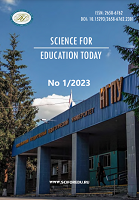Оценка знаний, формирующих у школьников осознанную потребность в здоровом питании как основном элементе здорового образа жизни
Assessment of the knowledge that forms a conscious need for healthy nutrition in school children as the main element of a healthy lifestyle
Author(s): Sergey Pavlovich Romanenko, O. A. Shepeleva, Aleksandra Vasilievna Sorokina, Irina Gennadyevna Shevkun, Irina Igorevna NovikovaSubject(s): School education, Educational Psychology, Behaviorism, Sociology of Education, Pedagogy
Published by: Новосибирский государственный педагогический университет
Keywords: Healthy eating; Bad eating habits; Schoolchildren; Awareness of the principles of healthy eating; Educational programs; monitoring of schoolchildren's nutrition;
Summary/Abstract: Introduction. The authors present the results of a study devoted to the issue of forming the basics of healthy eating for schoolchildren in the Russian Federation, which is the main goal of ‘Demography’ National project, aimed at monitoring schoolchildren’s nutrition and health. An important part of solving this problem is raising schoolchildren’s awareness of and their commitment to the principles of healthy nutrition, as factors reducing the risk of overweight and obesity, which are predictors of alimentary-related diseases. The aim of the research is to examine awareness of and adherence to the principles of healthy eating among schoolchildren with different body mass index in the Russian Federation in order to develop an integrated approach to activities and interventions aimed at developing healthy eating habits and eating behavior according the principles of healthy eating. Materials and Methods. The work used sociological (questionnaires), analytical and statistical research methods. The study was conducted in 66 constituent entities (federal subjects) of the Russian Federation among students in educational institutions and their parents (legal representatives) and heads of educational institutions in accordance with MR 2.3.0167-20, approved by the Chief State Sanitary Doctor of the Russian Federation A.Yu. Popova, March, 20, 2020). The study was conducted in the form of a sociological survey. The assessment of anthropometric indicators given by the respondents during the survey was carried out using the WHO methodology (2007). Statistical processing was conducted using the STATISTICA-10.0 system and Microsoft Excel using descriptive methods of statistics and t-test (in case of normal data distribution) and Fisher (U). Differences were considered statistically significant at p <0.05. Results. When analyzing the data of the survey, the authors found that the majority of schoolchildren and their parents (legal representatives) participating in the study are familiar with the principles of healthy eating, while only about a quarter of them follow these principles. Peculiarities were revealed in indicators of respondents' adherence to the rules of healthy eating depending on nutritional status, indicating a greater proportion of children with overweight and obesity among those who are unfamiliar with the principles of healthy eating. There were no significant differences in age and place of residence. However, all groups demonstrated low consumption of milk and dairy as well as wholemeal bread, which are characterized by large amounts of useful macro- and micronutrients. Priority sources of information about the principles of healthy eating have been established. They include healthcare workers, the Internet and television, respectively. It was revealed that in most educational institutions sanitary and educational work is carried out, aimed at developing skills and the need for a healthy diet. The largest number of children participating in the implementation of educational programs is primary school students with a low proportion of middle and senior school students. Conclusions. The study concludes that implementation of programs aimed at increasing schoolchildren's knowledge about the rules of healthy eating plays a significant role in ensuring healthy nutrition of schoolchildren, which contributes to the formation of adequate adaptive capabilities of the child's body and reducing the risk of alimentary-related pathology. The authors emphasize that when developing and implementing the programs it is necessary to pay attention to the identified features in the awareness of and commitment to the principles of healthy eating among overweight and obese schoolchildren and to increase the participation of middle and senior schoolchildren. The development of a family-associated approach to solving the problem is considered to be promising.
Journal: Science for Education Today
- Issue Year: 13/2023
- Issue No: 1
- Page Range: 135-158
- Page Count: 24
- Language: Russian

